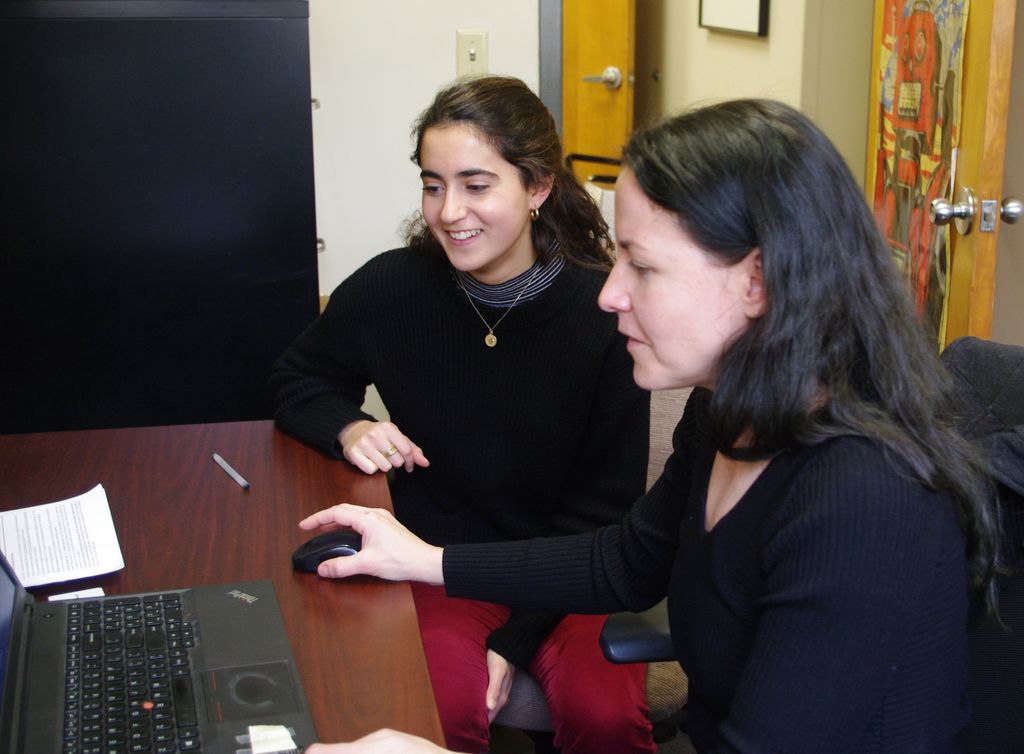A Look at Undergraduate Research: The Robot Revolution
When a woman took a nap on her floor and her robot vacuum cleaner sucked up her hair, the media response was predictably sensational: “A robot vacuum cleaner has fired the opening salvo in the impending war between man and machine” and “Woman is attacked as she sleeps by her ROBOT vacuum cleaner!”
It’s perhaps an overreaction when you consider the robot was just doing its job. This sensationalism is one trend College of General Studies Lecturer Joelle Renstrom is trying to counter in a new book she’s writing about robotics and artificial intelligence. With the assistance of undergraduate researcher Sofia Zalaquett (CGS’19, CAS’21), Renstrom is diving into topics such as technological unemployment, love and sex with robots, artist robots, and the always-intriguing question of robot consciousness.
Renstrom is trying to translate the science for a general audience and answer how the AI revolution will affect ordinary people. She says, “I don’t own a company, I don’t represent a lab, I don’t have a vested interest in this other than curiosity and wanting readers to … think about where the future is going so they potentially have some say in whether they’re pulled along or not.”

Thanks to funding from the Center for Interdisciplinary Teaching & Learning’s Undergraduate Research Experience, Zalaquett is receiving a stipend for her research work. She got a head start on the topic when she took Renstrom’s RH 102 class, which delves into robotics and artificial intelligence. Zalaquett is giving input into the table of contents and chapter outlines, finding news stories and interviewees, and helping to organize the research. She also pointed Renstrom to an online collaboration platform, AirTable, that has streamlined and organized their work. And she’s learning how to analyze the methodology and accuracy of the studies she’s looking at.
An international relations major, Zalaquett says the subject touches her own studies in a lot of ways: Technology has decentralized power, global leaders will have to decide how to deal with technological unemployment, and drones are a major issue when it comes to cybersecurity.
“It impacts economics. It impacts art. It impacts whatever major you can think of,” Zalaquett says. “I think everyone should be studying this at BU because it’s like a little peek and analysis of the future.” It has helped her connect her history classes to what happens next: “What can we do with what we’ve learned from the past?”
Renstrom says it’s helpful to have the perspective of someone who’s grown up as a digital native and can be a sounding board for the audience she’s trying to reach: “I’m not a Luddite but I have some real concerns about technology and I find it very useful to talk to somebody who grew up with way more tech than I did. .. If she’s less concerned about something I really want to know why.”
And in a field dominated by white men, it’s great to see two women collaborating on a STEM topic, Renstrom says: “I would just like to say that it’s awesome that a female professor and a female research student are working on a book about robots. Just saying, I think that’s awesome.”
— By Alisa Harris
This article is part of a series featuring undergraduate research at Boston University College of General Studies. The Undergraduate Research Experience is a unique opportunity for students to work directly with CGS faculty members on current research projects while earning a stipend for their research work.